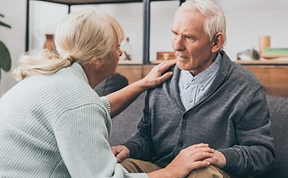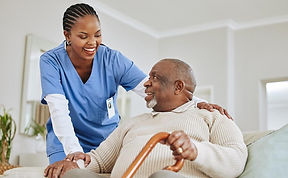
Skilled Nursing
PERSONALIZED CARE FOR YOUR UNIQUE NEEDS.
Our nurses are at your side 24 hours a day, seven days a week, always ON-CALL.
Our staff of nurses have been selected through rigorous screening to meet the high standards of quality care required for our agency, and new demands of the continually changing medical field. They are required to attend continuing education to stay up-to-date with the latest discoveries, regulations, and treatments in the industry.
We strive to maintain a qualified team, willing to help meet the goals of each Patient’s Plan of Care. Thus, in selecting our staff we look not only for professionalism, experience, and technical abilities, but just as important, we seek to find nurses who interact with kindness and compassion; people who love their profession, and demonstrate a willingness to achieve the goals of each patient.

PT / INR Monitoring
PT/INR is a test that measures the clotting ability of blood. It is often used to monitor the effectiveness of the drug warfarin in patients with blood clotting disorders. This test helps to ensure that the blood is clotting properly to prevent excessive bleeding or blood clots. Testing is done at home and sent to the doctor right away so we can make changes in medication if needed.

Cardiac Care Program
The goal of the cardiac care program is to improve the patient's heart health, reduce symptoms, and prevent rehospitalizations. Services provided in a cardiac care program may include medication management, lifestyle modifications, exercise therapy, nutrition counseling, and support groups. Education for patients and their families on how to manage heart disease and reduce their risk factors. The cardiac care program is important in helping patients achieve and maintain heart health, and can lead to improved quality of life and reduced healthcare costs.

Diabetic Management
The goal of diabetic management is to help individuals with diabetes maintain healthy blood sugar levels, prevent complications, and improve overall quality of life. Diabetic management strategies may include regular physical activity, maintaining a healthy diet, regular blood glucose monitoring, insulin therapy, and medication management. A comprehensive diabetic management plan also involves continuous education and support that helps the individual manage their condition effectively and make informed decisions about their health.

COPD Program
The goal of the COPD program is to improve the patient's ability to breathe, reduce symptoms, prevent exacerbations, and improve quality of life. Services provided in a COPD program may include medication management, pulmonary rehabilitation, oxygen therapy, respiratory therapy, and smoking cessation education. Our comprehensive COPD program also involves continuous education and support for the patient and their family, to help manage symptoms and prevent complications. The program aims to improve the patient's overall pulmonary function and ability to complete daily activities, as well as reduce rehospitalizations.

Ostomy Care
Ostomy care aims to help patients manage the physical, emotional, and social challenges that arise from living with an ostomy. This involves teaching patients how to empty and change their bags, monitor their skin for irritation, and prevent infections. Patients may also receive support and counseling to help them adjust to the changes in their body and lifestyle. Our effective ostomy care program includes a team of specialists, including ostomy nurses, physicians, and social workers, who work together to provide ongoing education, support, and care to patients with ostomy.

Incontinency Program
Services provided in the incontinency program may include pelvic floor muscle exercises, biofeedback training, bladder or bowel retraining, medication management, and surgical management. Additionally, dietary and fluid intake changes, as well as toileting schedules, may also be recommended. The program aims to improve the patient's overall continence, ability to perform physical and social activities, and promote emotional well-being. The Incontinency program is important in helping patients who are struggling with bladder or bowel control problems regain control of their lives and maintain their dignity and independence.

Anodyne Therapy Program
Our anodyne therapy program is administered by a licensed clinician who utilizes a specialized device that emits infrared energy at specific wavelengths, depending on the patient's condition. The device is placed directly on the skin in the targeted area, and the patient receives treatment for a set period of time. The goal of our anodyne therapy program is to provide patients with a non-invasive, drug-free option to manage chronic pain and improve their quality of life. Patients often report feeling relief from pain, improved circulation and range of motion, and reduced muscle tension as a result of anodyne therapy.

Pain Management Program
The pain management program involves educating patients about self-management techniques, such as stress reduction, relaxation techniques, and pacing activities, to help them manage their pain more effectively. Patients may also receive support and counseling to help them cope with the emotional and psychological effects of chronic pain. The program aims to improve patients' overall physical functioning, reduce reliance on medications, and promote emotional well-being. By helping patients regain control over their pain, a pain management program can significantly improve their quality of life and overall health outcomes.

Medication Reminder Calls
Unknowingly, individuals may double dose or skip doses resulting in a life-threatening situation. 40% of adults over the age of 65 enter nursing homes because they fail to self-medicate properly. We call our patients up to twice a day to remind them to take their medication and help keep them out of the hospital. Our nurses refill patients prescription box regularly to ensure accuracy. The frequency and timing of the calls are customizable based on the patient's needs. Our patients are able to live at home independently for longer, avoid hospital visits and reduce medical costs.

Dementia Care
Services provided in dementia care may include medication management, help with daily living activities (like eating, bathing, and dressing), cognitive stimulation therapy, and behavioral therapies. This can involve providing education, counseling, and respite care to relieve caregiver burden. It is important for the person with dementia to have a supportive social network that includes family members, friends, and healthcare professionals. Overall, the goal of dementia care is to promote the highest level of independence and quality of life possible for individuals with the disease, while supporting their caregivers and loved ones.

Wound Care Program
Our wound care program is a specialized treatment plan designed to manage and treat various types of wounds, including surgical wounds, pressure sores, diabetic ulcers, and other chronic wounds. The goals of our wound care program are to control infection, promote healing, prevent the recurrence of wounds, and minimize pain and discomfort for the patient. Our services include cleaning, application of specialized dressings, the use of negative pressure wound therapy, and other advanced wound healing technologies. We also coordinate services with mobile wound care physicians for debridement and overall wound care management when needed. Our successful wound care program can lead to improved outcomes and quality of life for patients, including faster healing, reduced hospital stays, and a decreased likelihood of infection or complications.

Wound Vac Therapy
Our Wound VAC therapy, or Negative Pressure Wound Therapy, is an advanced wound healing technology that helps to promote healing and manage wounds. The Wound VAC is a medical device that is placed over the wound and applies a controlled vacuum level to the wound bed. This vacuum assists in removing excess fluid and wound exudate, increasing blood flow, reducing inflammation and promoting wound healing. It is typically recommended for patients who have non-healing wounds, surgical wounds, pressure ulcers, diabetic ulcers, or other chronic wounds. The program is designed to improve patient outcomes, reduce pain, reduce the risk of infection, and speed up the healing process.

Post Operative Care
Our postoperative care program is a personalized plan designed to provide patients with the highest level of care following surgery. Our team of healthcare professionals, including nurses and physical therapists, will closely monitor the patient's recovery progress and identify any potential complications. They will work closely with the patient's surgeon to ensure that the care plan is tailored to the nature of the surgery. Our postoperative care includes pain management, medication management, wound care, physical therapy, and education regarding proper nutrition and lifestyle habits. We also offer emotional and psychological support to help patients cope with the stress and anxiety associated with surgery and postoperative recovery. Our goal is to provide patients with a safe and comfortable environment, ease their transition back to daily activities, and reduce the risk of complications.

Blood Pressure Monitoring
During each monitoring session, our trained healthcare professionals will measure the patient's blood pressure, record the readings, and provide guidance on how to maintain healthy blood pressure levels. This may include lifestyle modifications such as diet and exercise, medication management, stress management, and other strategies tailored to the individual's needs. Our blood pressure monitoring program aims to help patients prevent complications related to high blood pressure, such as heart disease, stroke, and kidney failure. By regularly monitoring blood pressure levels and implementing effective management strategies, our patients can maintain a healthy blood pressure and improve their overall health and well-being.
